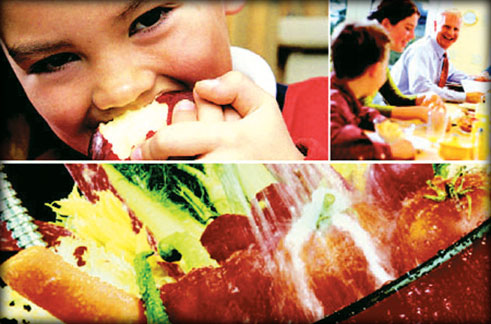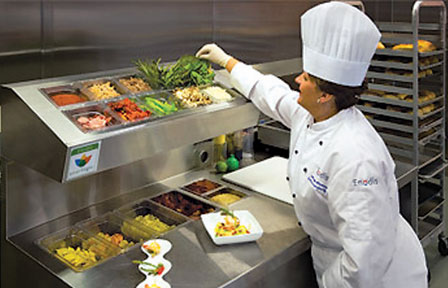ISO 22000 - a way forward for food safety
By Dr. Lalith Senaweera
A safe food supply that will not affect consumer health through
chemical, biological and physical contamination is essential for proper
nutrition.
 Consumers expect the food they buy to be safe and, therefore, the
industry has a responsibility to meet their expectations. In any food
safety program consumer protection and prevention of food-borne diseases
are two essential elements that are the shared responsibility of the
Government, the food industry and consumers. Consumers expect the food they buy to be safe and, therefore, the
industry has a responsibility to meet their expectations. In any food
safety program consumer protection and prevention of food-borne diseases
are two essential elements that are the shared responsibility of the
Government, the food industry and consumers.
However, there is increasing public concern about the contamination
of food as serious outbreaks of food borne diseases have been reported
in the past decade illustrates the social significance of these
diseases.
ISO 22000 Food Safety Management System
Therefore, it is essential to have effective food control management
systems based on the principles of risk-based approaches to handle
emerging food safety issues.
These systems are crucial in enabling countries to ensure the safety
and quality of the food entering international markets to conform to
international standards.
It is for these reasons that the ISO 22000 standard food safety
management system has been developed using the best management
principles incorporating risk-based approach to assure food safety.
The International Organisation for Standardisation has published a
series of standards on food safety as international standards are needed
to ensure the safety of the global food supply chain. The ISO 22000
family contains a number of standards each focusing on different aspects
of food safety management.
ISO 22000:2005 contains the overall guidelines for food safety
management.
ISO/TS 22004:2005 contains guidelines for applying ISO 22000 and ISO
22005:2007 focuses on traceability in the feed and food chain.
ISO 22000:2205 specifies requirements for a food safety management
system where an organisation in the food chain needs to control food
safety hazards to ensure that food is safe at the time of consumption.
The standard has requirements for Food Safety Management System
processes and procedures, and requires that the organisation implement
prerequisite programs and HACCP. ISO 22000 is a generic food safety
management standard, and can be used by any organisation directly or
indirectly involved in the food chain.
 |
|
Dr. Lalith Senaweera |
It applies to all organisations in the food chain. It doesn't matter
how complex the organisation is or what size it is, ISO 22000 can help
ensure the safety of its food products.
Structure of ISO 22000:2005
The food chain also includes organisations that do not directly
handle food. These include organisations that produce feed for animals
that produce food and for animals that will be used as food. It also
includes organisations that produce materials that will eventually come
into contact with food or food ingredients.
The ISO 22000 standard includes five sections to set up a sound food
safety management system: General requirements, Management
responsibility, Resource requirements, Planning and realisation and
validation, Verification and improvement.
Application of an effective ISO 22000:2005 Food safety Management
system requires the commitment of the management and involvement of
every employee in the company.
An effective application of ISO 22000:2005 leads to:
Identifying of critical control points to limit technical resources
targeted at the management of the food safety program.
Disciplined and systematic approach for continuous improvement in
product safety.
Providing confidence to consumers on food safety and assist in
demonstrating food safety and food hygiene regulations.
Demonstrate the professional approach of the organisation in
implementing food safety systems and enables the organisation to compete
more effectively in international markets.
Places the responsibility for ensuring food safety on the
organisation, it brings management commitment and encourages people from
all operational areas to take an active role in planning and
implementing food protection controls.
Encourages in-depth understanding and familiarity with the
procurement process of raw materials, manufacturing system and storage
and distribution, emphasising hazard prevention early in the food
production system.
Increase awareness among the employees of the organisation about the
important techniques that control the safety of food.
Communicate effectively food safety issues to suppliers, customers
and relevant interested parties in the food chain.
Benefits of ISO 22000:2005
It is an internationally recognised as one of the most-effective food
safety management systems of controlling food related problems
worldwide. It is also compatible with any other management systems. e.g.
ISO 9001 and demonstrates management commitment to food safety.
 The Sri Lanka Standards Institution (SLSI) has devised a scheme to
certify organisations against ISO 22000 Food Safety Management System
standard and over 100 organisations have been certified under this
scheme. The Sri Lanka Standards Institution (SLSI) has devised a scheme to
certify organisations against ISO 22000 Food Safety Management System
standard and over 100 organisations have been certified under this
scheme.
The SLSI has 30 professionally full-qualified auditors who conduct
audits and provide valuable inputs to business enterprises to improve
and maintain an effective Food Safety Management System while helping
them to penetrate international markets.
ISO 22000 requires one to build a Food Safety Management System. This
means that you will have a documented system in place and fully
implemented throughout your facility that includes:
Effective prerequisite programs to ensure a clean sanitary
environment.
A hazard analysis and critical control plan developed to identify,
prevent and eliminate food safety hazards.
Established documented food safety management system processes to
manage food safety throughout your organisation - from management and
business planning aspects to day-to-day communication and operations
affecting food safety.
The ISO 22000 standard contains the specific requirements to be
addressed by the Food Safety Management System (FSMS). The standard
requires food safety management system processes including:
Having an overall food safety policy for your organisation, developed
by top management.
Setting objectives that will drive your company to comply with this
policy.
Planning and designing a management system and documenting the
system.
Maintaining records of the performance of the system.
Establishing a group of qualified people to make up a Food Safety
team.
Defining communication procedures to ensure effective communication
with important contacts outside the company (regulatory, customers,
suppliers and others) and for effective internal communication.
Having an emergency plan.
Holding management review meetings to evaluate the performance of the
FSMS. Providing adequate resources for the effective operation of the
FSMS including appropriately trained and qualified personnel, sufficient
infrastructure and appropriate work environment to ensure food safety.
Implementing Prerequisite Programs.
Following HACCP principles.
Establishing a traceability system for identification of product.
Establishing a corrective action system and control of nonconforming
product.
Maintaining a documented procedure for handling withdrawal of a
product.
Controlling monitoring and measuring devices.
Establishing and maintaining an internal audit program.
Continually updating and improving the FSMS.
Read about the requirements in more detail in 'ISO 22000 Explained'.
ISO 22000:2005 specifies requirements for a food safety management
system where an organisation in the food chain needs to control food
safety hazards to ensure that food is safe at the time of consumption.
It is applicable to all organisations, regardless of size, which are
involved in any aspect of the food chain and wish to implement systems
that consistently provide safe products.
The means of meeting any requirements of ISO 22000:2005 can be
accomplished through the use of internal and external resources.
ISO 22000 is an international standard that defines the requirements
of a food safety management system covering all organisations in the
food chain from 'farm to fork'.
The writer is the Director General of the Sri Lanka Standards
Institute. |

